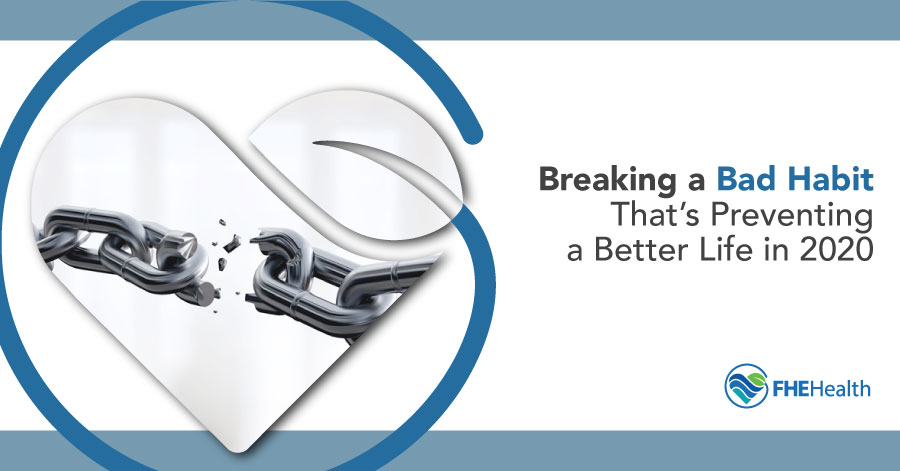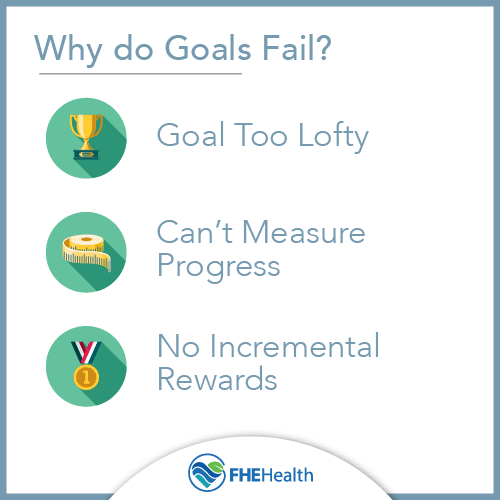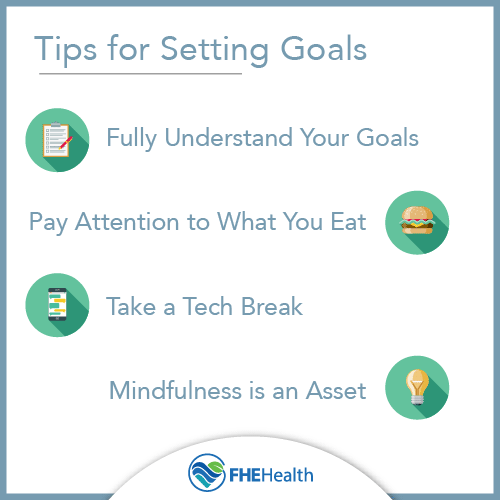
When the world seems uncertain, setting new goals can be a way to feel a sense of empowerment. However, it may be difficult to know where to begin. Whether you’re looking to break bad habits or start good ones, it’s crucial to invest some time in making a game plan to be successful.
This is the Time of Year For Self-Reflection and Setting Goals
 At the beginning of the year is a logical time to make some much-needed changes, especially when you need a solid starting point for breaking bad habits. It’s a fresh start, a way to self-motivate to analyze what went wrong or how you may have somehow sabotaged your efforts. It’s also a great time to figure out what’s important and what you hope to accomplish this year.
At the beginning of the year is a logical time to make some much-needed changes, especially when you need a solid starting point for breaking bad habits. It’s a fresh start, a way to self-motivate to analyze what went wrong or how you may have somehow sabotaged your efforts. It’s also a great time to figure out what’s important and what you hope to accomplish this year.
Setting goals is the only way to have a guideline or map to let you know how you’re progressing. If you include a mix of short-term and easier-to-achieve goals—along with your longer-term and likely more difficult ones, such as smoking or quitting junk food—you’ll be more likely to keep working on them.
You’ve Probably Made Commitments Before That Didn’t Work Out
Most people have a list of commitments they’ve attempted to keep and that didn’t work out as they’d hoped. If this has happened to you, you’re not alone. In fact, the statistics on broken resolutions is fairly disconcerting. For example, an article in Business Insider highlights the estimate that up to 80 percent of New Year’s resolutions fail by February. Apparently, in one month’s time, many people lose interest or motivation in continuing to pursue the goals they so adamantly chose at the dawn of the new year.
Another interesting statistic comes from researchers at University College London, who found that it takes about 66 days to break a bad habit completely and likely much longer to master a new one. This likely applies to goals such as breaking addictive habits, as much as it does to breaking all habits, since when you commit to breaking a habit, you’ll need quite a bit of time for the new habit to “stick.”
Remember, just because you’ve made a pledge or committed to breaking habits before and gave up on it or the results weren’t satisfactory doesn’t mean you can’t tackle it again— with lessons learned from prior experience and a renewed determination to succeed.
How Long Does It Take to Form or Break a Habit?
Most people have a list of goals they’ve attempted that didn’t work out as planned. This is usually because they underestimate the amount of commitment it takes to form or break a habit. Researchers at University College London found it takes about 66 days to break a bad habit completely and even longer to master a new one. They agreed that even though the amount of time you commit is important, consistency is what changes a behavior into a habit. The more often you repeat a task over time, the more likely it’ll become a subconscious part of your daily routine.
This isn’t to say that just because you’ve made a pledge to break a habit before with unsatisfactory results, you can’t tackle it again. Research shows that on average it takes around 6 attempts before someone can successfully quit smoking. Everyone makes mistakes, so don’t let a past failure keep you from your goals. Take what you’ve learned and apply it to your next attempt.
What Makes Us Fail Our Goals?
 There are many reasons why we may not be able to achieve our goals. This doesn’t mean we’re never going to be successful with a given goal, just that we may need to adopt a different mindset, vary our approach, streamline the goal, make it more realistic, or perhaps even broaden it. Some of the common reasons why we fail our goals include:
There are many reasons why we may not be able to achieve our goals. This doesn’t mean we’re never going to be successful with a given goal, just that we may need to adopt a different mindset, vary our approach, streamline the goal, make it more realistic, or perhaps even broaden it. Some of the common reasons why we fail our goals include:
- The goal itself may be too lofty. We’re trying to reach for the stars and we haven’t secured the appropriate mechanism to get there. Maybe scale back a bit and start with something small.
- There’s no way to measure the goal to see if we’re close to achieving it. You must have measurement built into the goal pursuit process. Otherwise, you won’t know if you’re spinning away from the goal or coming near.
- Pursuit of the goal doesn’t allow for rewards. If the goal is an all-or-nothing concept, it may be too daunting, sapping motivation in the early stages of trying to achieve it. You need to include interim rewards to keep your enthusiasm high and encouraging you to tackle the tougher work that may come later.
- Not allowing for failure: If the goal is an all-or-nothing concept, it may be too daunting, sapping motivation in the early stages of your plan. You need to include interim rewards to keep your enthusiasm high.
Tips for Breaking a Bad Habit
Not sure how to begin living your best life? Here are some workable tips to help you get started.
Fully Understand Your Goal – Including What You Want Out of It
Having only a vague notion of what you want to achieve isn’t likely to result in a successful outcome. You need to fully understand your goal, including every aspect of it you can think of. How does this goal differ from similar goals you’ve had in the past? What specific measures will you use to determine success? Zero in on what you want, and once you’re clear on what you want to achieve, you’ll be ready to focus on other details.
It’s also important to be realistic when visualizing your goal. Shooting for the moon may be your heart’s desire, but it’ll also undermine any smaller achievements you make along the way. Instead of planning to lose 50 pounds, make a commitment to eat more vegetables every day. Setting an achievable goal that you can work toward every day is much more likely to make you successful.
Pay Attention to What You Eat
 When most people gear themselves up to break a bad habit, they give little thought to the role that healthy eating plays. Having a good diet provides the extra motivation and energy you need to achieve other tasks. Part of the cycle of breaking bad habits is replacing them with good ones, so no matter what your plan is, make it a point to improve your diet.
When most people gear themselves up to break a bad habit, they give little thought to the role that healthy eating plays. Having a good diet provides the extra motivation and energy you need to achieve other tasks. Part of the cycle of breaking bad habits is replacing them with good ones, so no matter what your plan is, make it a point to improve your diet.
As you work on your healthy eating habits, the CDC recommends:
- Improve your diet gradually.
- Eat only when you’re hungry.
- Eat slowly and mindfully.
- Plan your meals ahead of time.
Take a Tech Break
Technology is integral to our world — sometimes too much so. If you find yourself compelled to constantly check your phone for updates or can’t go to sleep without it nearby, you need a tech break. When your mind is devoted to scrolling through social media or fuzzy from a long night of online shopping, you won’t be able to focus on other commitments. Keep in mind that a tech break isn’t forever. You’re just giving yourself a slight hiatus from all that connectedness.
Mindfulness is a Terrific Assist
When you’re working on breaking bad habits, adopting healthy new ones, coping with addictive habits you’re diligently trying to overcome, mindfulness can be a tremendous help. Significantly, mindfulness meditation, mindfulness practice, being mindful while you eat, and valuing mindfulness in everyday life pays dividends regardless of whether you can immediately measure outcomes or not. For example, mindfulness can help you detach from thoughts and connect to the present.
Some Habits Do Require Professional Help
There are some challenges that may be too daunting to tackle alone. This includes addictive habits and behaviors caused by mental disorders. If you find yourself suffering or having difficulties in recovery, know that you’re not alone. Consider seeking help from a medical or mental health professional. FHE’s compassionate team of counselors are available 24/7 to help with the challenges you’re facing. Contact us at (833) 596-3502 and start your journey to recovery today.






